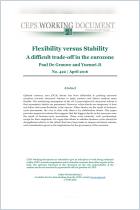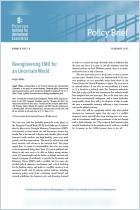
Read or listen offline
áudio gerado automaticamente
1×
áudio gerado automaticamente
Recommendation
Spreads on sovereign debt in 2014 are far more amenable to euro-zone governments than they were in 2010 to 2012, yet the finances of many of the peripheral members are far from healthy. The breathing space afforded by lower rates is largely due to intervention from the European Central Bank (ECB), whose actions have drawn sharp rebuke from some, particularly in Germany. getAbstract recommends this brief paper for its cogent analysis of the euro sovereign-debt markets, the opposition to ECB programs and the implications of political union on the future of the euro.
Take-Aways
About the Authors
Paul De Grauwe is a professor at the London School of Economics. Yuemei Ji is a researcher at Brunel University.
By the same authors
Report


















Comment on this summary or Iniciar a Discussão